1818

After Congress passed an enabling act, Illinois became the 21st state admitted to the Union. The state's first two senators, Jesse Burgess Thomas and Ninian Edwards, both of Edwardsville, took their seats and were sworn into office on December 4. They drew lots to determine their class assignments. Edwards drew Class 1, with a term to expire March 3, 1819. Thomas drew Class 3, with a term to expire March 3, 1823.
1820
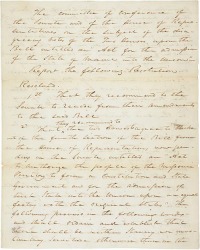
Congress agreed to the Missouri Compromise, which admitted Maine as a free state and allowed the Territory of Missouri to draft a constitution and form a state government without restrictions on slavery. Illinois senator Jesse Thomas introduced the provision which prohibited slavery north of Missouri's southern boundary, with the exception of Missouri.
1826

Former senator Ninian Edwards took office as the state of Illinois's third governor. He held the position for four years.
1842
Kaskaskia lawyer and future senator James Shields of Belleville nearly engaged in a duel with Abraham Lincoln. Shields had challenged Lincoln after Lincoln penned a letter published in a newspaper that poked fun at Shields, who then served as the state auditor. As Illinois state law prohibited dueling, the two men met across the border to resolve their dispute. After friends intervened, both men resolved their disagreement and a friendship developed.
1849
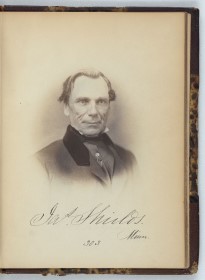
Having been denied a seat in the Senate months earlier on grounds that he had not been a U.S. citizen for the required nine years, James Shields again won election to the Senate. This time, the Senate accepted his credentials, seating him on December 3. Losing a bid for reelection in 1855, he subsequently won a Senate seat in Minnesota and later in Missouri, becoming the only person to represent three states in the Senate.
1850
Senator Henry Clay of Kentucky introduced in the Senate a series of resolutions that sought to resolve the question of slavery in the southwestern territories acquired after the Mexican War. These resolutions became known as the Compromise of 1850. After Congress rejected Clay's omnibus bill, Senator Stephen A. Douglas of Chicago, negotiating quietly, helped ensure congressional passage of the compromise resolutions individually.
1851

Senator James Shields became chairman of the Committee on Military Affairs, (today's Committee on Armed Services) and served until 1855.
1854
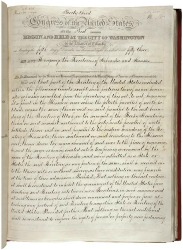
After months of bitter debate, the Senate passed Senator Stephen A. Douglas's bill organizing the territories of Kansas and Nebraska. The Kansas-Nebraska Act was highly controversial because it replaced the Missouri Compromise's geographical restriction on slavery with "popular sovereignty," allowing settlers of the territory to decide whether to permit or prohibit slavery.
1856

The Senate voted to uphold the claim of Lyman Trumbull of Alton to his Senate seat. He had been elected by the state legislature on February 8, 1855, but opposition Democrats claimed that he was ineligible for the Senate seat. The challenge to Trumbull's credentials provoked heated debates over the nature of states' rights.
1858

The Illinois state Republican convention nominated Abraham Lincoln to challenge Democratic senator Stephen A. Douglas for his seat in the U.S. Senate. This was the first time a political party, meeting in state convention, had endorsed a candidate for the U.S. Senate, thereby infringing on the state legislature's constitutional responsibilities. Receiving his party's nomination, Lincoln then delivered his immortal "House Divided" speech.
1858
Campaigning for a U.S. Senate seat from August to October, Abraham Lincoln and Senator Stephen A. Douglas debated each other in seven Illinois towns. In the so-called Lincoln-Douglas debates, the two candidates discussed their views on slavery: Lincoln favored abolition of slavery, while Douglas spoke in support of popular sovereignty, believing settlers should decide for themselves whether to prohibit or allow slavery to exist. Several months after the debates, the state legislature met to exercise its responsibility to fill the Senate seat and reelected Douglas by a margin of 54 to 46. About that experience, Lincoln commented to a friend, "It hurts too much to laugh and I am too big to cry."
1858
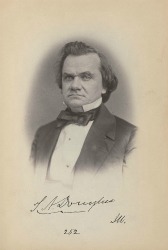
Pro-slavery Democratic senators stripped Senator Stephen A. Douglas of his chairmanship of the Committee on Territories in retaliation for his "moderate" views on slavery.
1860
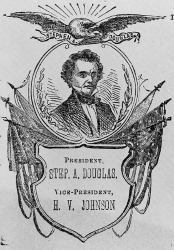
Senator Stephen A. Douglas was nominated for president of the United States in Baltimore, Maryland, by the northern faction of the Democratic Party. He lost the election to Abraham Lincoln.
1861
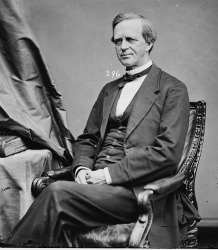
Senator Lyman Trumbull became chairman of the Committee on the Judiciary, serving until 1872.
1861
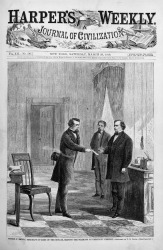
The Senate elected George T. Brown of Alton sergeant at arms of the Senate. He held that post until March 22, 1869.
1872

Senator John Alexander Logan of Chicago became chairman of the Committee on Military Affairs (today's Committee on Armed Services), serving until 1877. He chaired the committee again from 1881 to 1886.
1873

After serving only 10 days, Governor Richard Oglesby (who had previously served as governor from 1865 to 1869) resigned his seat having been elected to the U.S. Senate. Oglesby later served a third time as governor from 1885 to 1889.
1877

Supreme Court justice David Davis of Bloomington resigned from the court after winning election as an independent to the U.S. Senate. He did not seek reelection in 1882 and left the Senate in March 1883.
1881
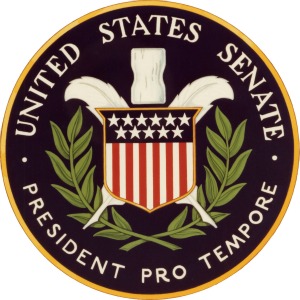
David Davis was elected Senate president pro tempore. With the office of vice president vacant, President pro tempore Davis stood next in line of succession to the presidency. He held that post until he left the Senate in March 1883.
1884
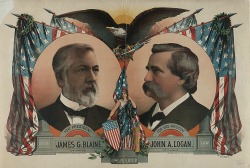
Senator John A. Logan was nominated for vice president of the United States at the Republican Party Convention held at Exposition Hall in Chicago. His presidential running mate was James G. Blaine of Maine. They lost to Democratic presidential candidate Grover Cleveland and vice presidential candidate Thomas A. Hendricks, a former senator from Indiana.
1893

Adlai E. Stevenson of Bloomington presided over the Senate as the 23rd vice president of the United States
1893
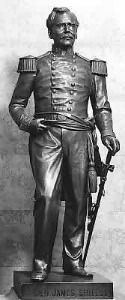
Congress accepted Illinois's first contribution to the National Statuary Hall Collection—a bronze statue of James Shields.
1901
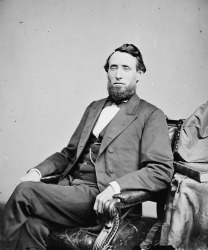
Senator Shelby Moore Cullom of Springfield became chairman of the Committee on Foreign Relations, serving until 1913.
1905
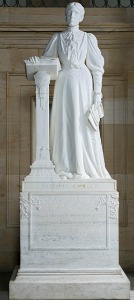
Congress accepted Illinois's second contribution to the National Statuary Hall Collection—a marble statue of Frances E. Willard. This was the first statue of a woman to be placed in Statuary Hall.
1912

The Senate declared the election of William Lorimer of Chicago invalid over allegations that he had obtained his seat by bribery and corruption. The resulting storm of public outrage over the Lorimer case, combined with an infusion of recently elected progressive minded members, led the Senate on June 12, 1911, to approve a long pending constitutional amendment providing for direct popular election of senators.
1913

Upon his retirement, Senator Shelby Cullom established a 30-year service record, making him the longest-serving senator in Illinois history.
1913

The Seventeenth Amendment to the U.S. Constitution went into effect allowing the direct election of U.S. senators. Lawrence Yates Sherman of Springfield, who had been elected to the Senate by the state legislature in 1913, was Illinois's first popularly elected senator, winning election in 1914.
1913

Senate Democrats elected James Hamilton Lewis of Chicago as their first party whip. He held that post until 1919, and again from 1933 to 1939.
1919
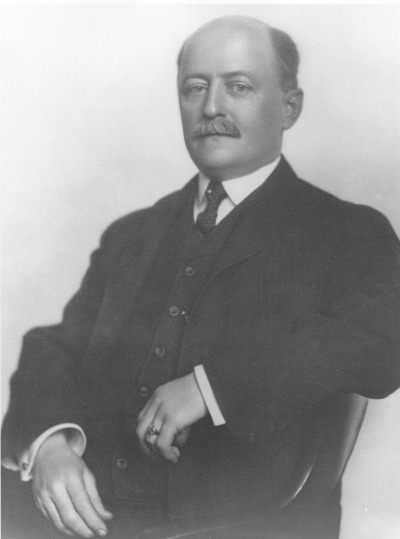
The Senate elected George A. Sanderson of Illinois as secretary of the Senate. He held that post until April 24, 1925.
1928
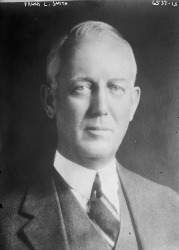
The Senate rejected the credentials of Frank L. Smith of Dwight following charges that he accepted campaign donations from the Illinois public utilities he oversaw as chairman of the Illinois Commerce Commission. Subsequently, he tendered his resignation.
1933

Senator Otis F. Glenn of Murphysboro delivered George Washington's 1796 Farewell Address to the U.S. Senate, a tradition dating to 1862.
1939
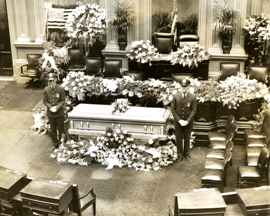
With the sudden death of Senator J. Hamilton Lewis, the Senate recessed for the day. In honor of the Illinois senator, his funeral service was held in the Senate Chamber on April 12, with President Franklin Roosevelt, justices of the Supreme Court, and other dignitaries in attendance.
1940
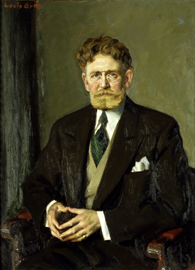
Without ceremony, a portrait of the late J. Hamilton Lewis by Louis Betts was hung in the U.S. Capitol. The portrait was presented by the senator’s widow to the Joint Committee on the Library shortly before it was exhibited in the Senate wing of the Capitol.
1947

Senate Democrats elected Scott Wike Lucas of Havana as their party whip. He held that post until 1949, when he advanced to party leader.
1947
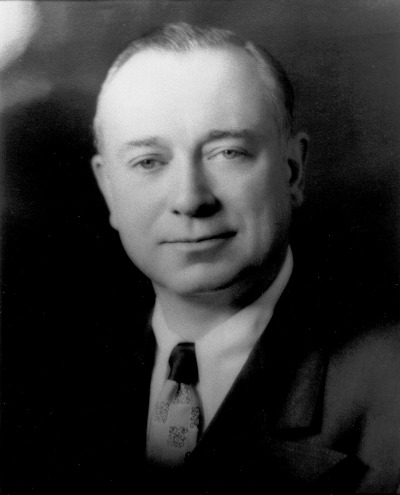
The Senate elected Edward F. McGinnis of Illinois sergeant at arms of the Senate. He held that post until January 2, 1949.
1947

Senator Charles Wayland Brooks of Chicago became chairman of the Committee on Rules and Administration, serving until 1949.
1948
Senate Democrats elected Scott W. Lucas as their floor leader, effective January 20, 1949. He held that post until 1951.
1959

Senate Republicans elected Everett McKinley Dirksen of Pekin as their floor leader. He held that post until his death on September 7, 1969. He was the minority leader during his entire tenure.
1965
Future senator Richard J. Durbin served as an intern on the staff of Senator Paul H. Douglas from 1965 to 1966.
1981

Senator Charles Harting Percy of Wilmette became chairman of the Committee on Foreign Relations, serving until 1985.
1992

Illinois voters elected the first African American woman to the U.S. Senate. Senator Carol Moseley Braun of Chicago, a former prosecuting attorney, had previously served in the Illinois house of representatives from 1978 to 1988.
1994
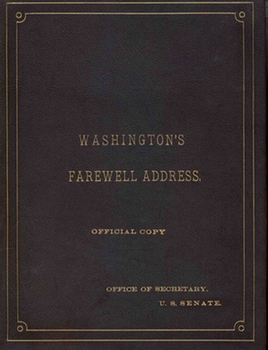
Senator Carol Moseley Braun delivered George Washington's 1796 Farewell Address to the U.S. Senate, a tradition dating to 1862.
2000

Senator Peter G. Fitzgerald of Inverness received the Golden Gavel Award for presiding over the Senate 100 hours in a single session.
2007
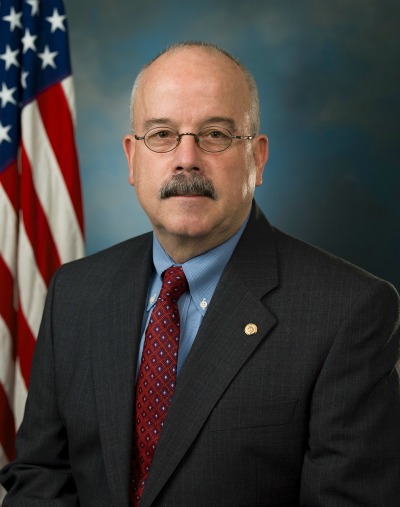
The Senate elected Terrance W. Gainer of Chicago as its 38th sergeant at arms, a position he held until May 4, 2014. He had previously served as chief of the U.S. Capitol Police.
2008

Senator Barack Obama, who had been nominated as the Democratic presidential candidate in August 2008, became the nation’s first African American to be elected president of the United States. Obama’s running mate was Senator Joseph R. Biden Jr. of Delaware. Obama and Biden were sworn into office on January 20, 2009.
2009
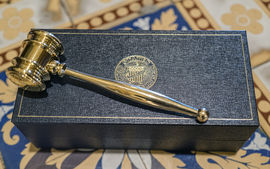
Senator Roland Burris of Chicago earned the Golden Gavel Award for presiding over the Senate for 100 hours in a single session.
2010

Senator Roland Burris delivered George Washington's 1796 Farewell Address to the U.S. Senate, a tradition dating to 1862.
2019

Senator Richard Durbin became the longest-serving Senate whip, surpassing the 14-year record set by Alan Cranston of California.
2021
Senator Richard Durbin became chairman of the Senate Committee on the Judiciary, a position he held until January 7, 2025.
2022

Senator Tammy Duckworth earned the Golden Gavel Award for presiding over the Senate for 100 hours in a single session.